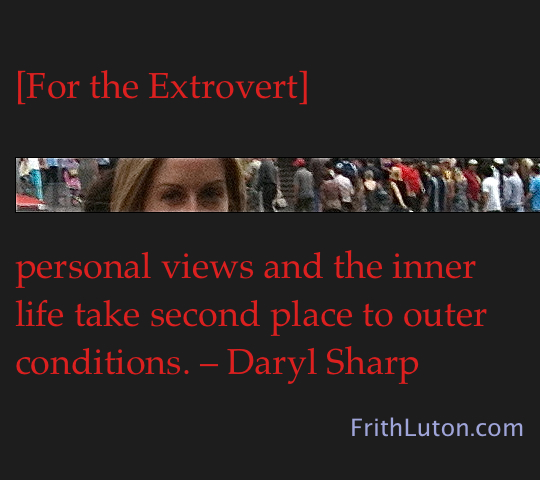Extraversion. A mode of psychological orientation where the movement of energy is toward the outer world. (Compare introversion.)
Extraversion is characterized by interest in the external object, responsiveness, and a ready acceptance of external happenings, a desire to influence and be influenced by events, a need to join in and get “with it,” the capacity to endure bustle and noise of every kind, and actually find them enjoyable, constant attention to the surrounding world, the cultivation of friends and acquaintances, none too carefully selected, and finally by the great importance attached to the figure one cuts. [“Psychological Typology,” CW 6, par. 972.]
Jung believed that introversion and extraversion were present in everyone, but that one attitude-type is invariably dominant. When external factors are the prime motivating force for judgments, perceptions, affects and actions, we have an extraverted attitude or type.
The extravert’s philosophy of life and his ethics are as a rule of a highly collective nature with a strong streak of altruism, and his conscience is in large measure dependent on public opinion. [Ibid.]
Jung believed that type differentiation begins very early in life, so that it might be described as innate.
The earliest sign of extraversion in a child is his quick adaptation to the environment, and the extraordinary attention he gives to objects and especially to the effect he has on them. Fear of objects is minimal; he lives and moves among them with confidence … and can therefore play with them freely and learn through them. He likes to carry his enterprises to the extreme and exposes himself to risks. Everything unknown is alluring. [“Psychological Types,” ibid., par. 896.]
In general, the extravert trusts what is received from the outside world and is not inclined to examine personal motivations.
He has no secrets he has not long since shared with others. Should something unmentionable nevertheless befall him, he prefers to forget it. Anything that might tarnish the parade of optimism and positivism is avoided. Whatever he thinks, intends, and does is displayed with conviction and warmth. [“Psychological Typology,” ibid., par. 973.]
Although everyone is affected by objective data, the extravert’s thoughts, decisions and behavior are determined by them. Personal views and the inner life take second place to outer conditions.
He lives in and through others; all self-communings give him the creeps. Dangers lurk there which are better drowned out by noise. If he should ever have a “complex,” he finds refuge in the social whirl and allows himself to be assured several times a day that everything is in order. [Ibid., par. 974.]
The psychic life of the extreme extraverted type is enacted wholly in reaction to the environment, which determines the personal standpoint. If the mores change, he adjusts his views and behavior patterns to match. This is both a strength and a limitation.
Adjustment is not adaptation; adaptation … requires observance of laws more universal than the immediate conditions of time and place. The very adjustment of the normal extraverted type is his limitation. He owes his normality … to his ability to fit into existing conditions with comparative ease. His requirements are limited to the objectively possible, for instance to the career that holds out good prospects at this particular moment; he does what is needed of him, or what is expected of him, and refrains from all innovations that are not entirely self-evident or that in any way exceed the expectations of those around him. [“General Description of the Types,” CW 6, par. 564.]
Extraversion is an asset in social situations and in relating to the external environment. But a too-extraverted attitude may result in sacrificing oneself in order to fulfil what one sees as objective demands – the needs of others, for instance, or the requirements of an expanding business.
This is the extravert’s danger: He gets sucked into objects and completely loses himself in them. The resultant functional disorders, nervous or physical, have a compensatory value, as they force him into an involuntary self-restraint. Should the symptoms be functional, their peculiar character may express his psychological situation in symbolic form; for instance, a singer whose fame has risen to dangerous heights that tempt him to expend too much energy suddenly finds he cannot sing high notes. … Or a man of modest beginnings who rapidly reaches a social position of great influence with wide prospects is suddenly afflicted with all the symptoms of mountain sickness. [Ibid., par. 565.]
The form of neurosis most likely to afflict the extravert is hysteria, which typically manifests as a pronounced identification with persons in the immediate environment.
The extravert’s tendency to sacrifice inner reality to outer circumstances is not a problem as long as the extraversion is not too extreme. But to the extent that it becomes necessary to compensate the inclination to one-sidedness, there will arise a markedly self-centered tendency in the unconscious. All those needs or desires that are stifled or repressed by the conscious attitude come in the back door, in the form of infantile thoughts and emotions that center on oneself.
The more complete the conscious attitude of extraversion is, the more infantile and archaic the unconscious attitude will be. The egoism which characterizes the extravert’s unconscious attitude goes far beyond mere childish selfishness; it verges on the ruthless and brutal. [Ibid., par. 572.]
The danger then is that the extravert, so habitually and apparently selflessly attuned to the outside world and the needs of others, may suddenly become quite indifferent.
© from Daryl Sharp’s Jung Lexicon, reproduced with kind permission of the author.
